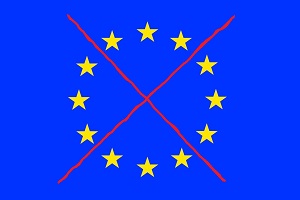
| Home | Future Events | Previous Events | People | Articles | Reviews | AboutUs |
Opinion Piece: Why I Want Out of the European Union
by Caspar Hewett

|

|
There are two main reasons why I want out: first and foremost, because of the deeply undemocratic nature of the EU and secondly because it is, and always has been, a tool to keep the rest of the world (notably the developing world) at an economic disadvantage.
To me it seems that the main issues have been seriously under-discussed in the campaign, and there has been an inexcusable volume of name-calling and contempt for ordinary people in the coverage. Sadly, it is no surprise and says a lot about the degraded level of politics today. Here is a quote from Richard Dawkins: ‘If there are issues on which the populace at large should be trusted to vote, something as complicated and economically sophisticated as EU membership is definitely not one of them.’ It would be shocking if it weren’t for the fact that this has been the tone of much of the media coverage.
There has also been an inexcusable volume of scaremongering from both camps about the economy and about immigration, but these shouldn’t be taken at face value. What they really represent is the political elite attempting to avoid the central issue of popular sovereignty, i.e. the principle that the authority of government and the state is created and sustained by our consent. The government of the day can be held to account by the people, if only by voting them out at general election time.
Whatever the problems may be with our democracy (and there are plenty) they pale into insignificance compared to those associated with the EU. How often are we consulted about or involved in the direction of the EU? Decision-making is remote and it is almost impossible to hold anyone to account for decisions made, be they made by individuals, parties of even whole nations. This makes a huge contribution to the sense of disenfranchisement that so many of us feel today. The focus of the campaign on the economy and immigration is simply evading the issue. As someone who is passionate about real change and a better future for all I want people to be able to hold decision-makers to account and (even better) to be directly involved in shaping the future. I don't for a moment imagine that suddenly it will be easy to change things if we exit the EU, but I am sure that staying in it will further disengage people from trying - young and old alike.
I have had a lot of people suggest in the last few days that by voting to leave the EU I will be opening the door to a UK run by Boris Johnson, UKIP and the extreme right. Not only do I not buy this, but I think it is a view that is hugely problematic. People need to vote in this referendum based on what they think of the EU and our membership of it, not on what they think of the people who happen to be getting the most coverage in the leave camp. I am voting on the actual question we are being asked to vote on.
I have also had people point out that there are various protections for example for employment rights which have been imposed by the EU that “the right” would happily do away with if we leave. My answer to that is that if we want improved employment rights we should fight for them here, not rely on the Brussels bureaucracy to assign them to us. The same is true of all rights. I know it is hard to win such battles, but actually all of our most significant rights have been won through popular campaigns and real struggles, through winning arguments and really engaging people, getting enough people on side to make change happen. My long-term commitment to public debate is premised on my belief that that open discussion underpins the right way to change things, not by calling on a remote court to settle questions on our behalf.
There has also been a great deal of speculation about what will happen to the economy if we leave, but it is just that – speculation. Nobody really knows and expert opinion is divided on whether we would be better off in or out. David Cameron would have you think otherwise: on BBC’s Question Time last night he repeatedly claimed that all the experts agree, but this is simply not true – the subset of “experts” he mentioned such as the governor of the Bank of England and Institute For Fiscal Studies may agree, but these are not “all the experts.”
Finally, as a humanist and internationalist I am on the side of people the world over and the EU is simply not compatible with such a view. Even in its infancy the EEC kept people in the developing world out of markets, which I have always thought appalling. The single market keeps billions of people in the least well-off parts of the world at a disadvantage at the expense of some of the richest nations of the world.
What has been clear in the run up to the referendum is quite how out of touch the political elite and the media are with the general mood. People are rightly sceptical about the arguments from both sides and yet, when they express that scepticism, they are dismissed as ignorant and naive, unable to grasp the issues. David Cameron’s comments yesterday about how people have been finding the debate “perhaps quite confusing” is typical of this condescending attitude. While there is a highly negative side to this there is also something rather positive about it – it highlights a divide between the politicians (of all persuasions) and the elites and the rest of us, exposing something real and raw that has been somewhat obscured in recent years. With a bit of luck that will help to spark some real debate about what we think about other issues whatever the outcome of the referendum.
Caspar Hewett, Director, The Great Debate
21 June 2016
The Great Debate is a not-for-profit community organisation dedicated to maintaining a space for public discussion through courses, day schools, debates and workshops for the general public on topics ranging from Darwinism and human nature, to free speech and environmental thought. www.thegreatdebate.org.uk
If you would like to comment on this article, or on anything else on
The Great Debate site, you can visit
The Great Northern Debate
facebook page
&/or you can join
The Great Debate facebook group
Follow us on Twitter: @greatdebateuk
| Home | Future Events | Previous Events | People | Articles | Reviews | AboutUs |
© Caspar Hewett, 2016